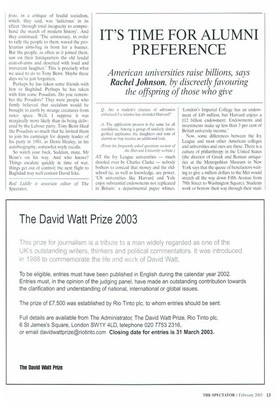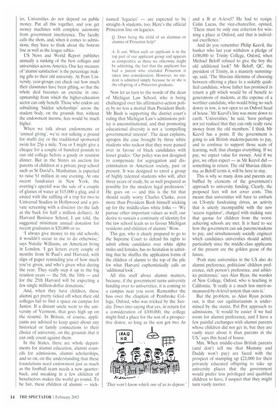IT'S TIME FOR ALUMNI PREFERENCE
American universities raise billions, says
Rachel Johnson, by discreetly favouring
the offspring of those who give
Q. Are a student's chances of admission enhanced if a relative has attended Harvard?
A. The application process is the same for all candidates. Among a group of similarly distinguished applicants, the daughters and sons of alumni/ac may receive an additional look.
(From the frequently asked questions section of the Harvard University websire.)
AT the Ivsf League universities — much drooled over by Charles Clarke — nobody bothers to conceal that money and the oldschool tie, as well as knowledge, are power. 'US universities like Harvard and Yale enjoy substantial endowments not replicated in Britain, a departmental paper whines. 'London's Imperial College has an endowment of £49 million, but Harvard enjoys a i12 billion endowment. Endowments and investments make up less than 3 per cent of British university income.'
Now, some differences between the By League and most other American colleges and universities and ours are these, There is a culture of philanthropy in the United States (the director of Greek and Roman antiquities at the Metropolitan Museum in New York says that the queue of benefactors waiting to give a million dollars to the Met would stretch all the way down Fifth Avenue from 79th Street to Washington Square). Students work or borrow their way through their stud ies. Universities do not depend on public money. Put all this together, and you get money machines with complete autonomy from government interference. The faculty calls the shots, and, when it comes to admissions, they have to think about the bottom line as well as the league tables.
US News and World Report publishes annually a ranking of the best colleges and universities across America. One key measure of 'alumni satisfaction' is the percentage making gifts to their old university. At Penn University, year-groups can check out how much their classmates have been gifting, so that the whole deal becomes an exercise in oneupmanship from which the higher-education sector can only benefit. Those who endow are subsidising 'hidden scholarships' across the student body, on the grounds that, without the endowment income, fees would be much higher.
When we talk about endowments or 'annual giving', we're not talking a pound for mufti day or the traditional sponsored swim for 25p a mile. You or I might give a cheque for a couple of hundred pounds to our old college before a gaudy or reunion dinner, But in the States an auction for parents of children at a private prep school such as St David's, Manhattan, is expected to raise Si million in one evening. At one recent fundraiser in New York, the evening's aperitif was the sale of a couple of glasses of water at S15.000 a glug, and it ended with the raffling of a trip for two to Universal Studios in Hollywood and a private screening with a director (to the lady at the back for half a million dollars). At Harvard Business School, I am told, the suggested minimum annual donation for recent graduates is $20.000 or so.
'I always give money to my old schools; it wouldn't occur to me to do otherwise,' says Natalie Williams, an American living in London. 'I get letters every couple of months from St Paul's and Harvard, with slips of paper reminding you of how much you've given, and who's given what during the year. They really step it up in the big reunion years — the 5th. the 10th — and for the 25th Harvard will be expecting a few single million-dollar donations.'
And, when they have children, these alumni get pretty ticked off when their old colleges fail to find a space on campus for Junior. If a distant uncle went to the university of Vermont, that goes high up on the resume. In Britain, of course, applicants are advised to keep quiet about any historical or family connections to their choice of university, on the grounds that it can only count against them.
In the States, there are whole departments for alumni education, alumni councils for admissions, alumni scholarships, and so on, on the understanding that these foundations need endowment just as much as the football team needs a new quarterback, and sneaking in a few children of benefactors makes the world go round. To be fair, these children of alumni — nick
named `legacies' — are expected to be straight-A students, too. Here's the official Princeton line on legacies.
Q. Does being the child of an alumnus or alumna of Princeton help?
A. It can. When such an applicant is in the top part of our applicant group and appears as competitive as those we otherwise might he admitting. the fact that the applicant has had a parent who attended Princeton is taken into consideration. However, no student is admitted simply because he or she is the offspring of a Princeton graduate.
Now let us turn to the words of the dean of Michigan Law School, who is being challenged over his affirmative-action policy by no less a mortal than President Bush. Mr Bush is supporting the district court's ruling that Michigan Law's admissions policy is unconstitutional, and that promoting educational diversity is not a `compelling governmental interest'. The dean explains, apropos the case brought by three white students who reckon that they were passed over in favour of black candidates with lesser grades: 'Our policy was not designed to compensate for segregation and discrimination in American society, past or present. It was designed to enrol a group of highly talented students who will, after three years of study, be as well prepared as possible for the modern legal profession.' He goes on — and this is the bit that should really worry Charles Clarke, even more than President Bush himself sticking up for the middle-class white folks — `We pursue other important values as well; our desire to sustain a continuity of identity for the law school leads us to favour Michigan residents and children of alumni.' Wow.
This guy, who is clearly prepared to go to the Supreme Court to defend his rights to admit ethnic candidates over white alpha males and females, has no hesitation in admitting that he shuffles the application forms of the children of alumni to the top of the pile for what Harvard euphemistically calls an 'additional look'.
All this stuff about alumni matters, because, if the government turns university funding over to universities, it is coming to a campus near you soon. Remember the fuss over the chaplain of Pembroke College, Oxford, who was tricked by the Sunday Times into saying that yes, in return for a consideration of £300,000, the college might find a place for the son of a prospective donor, so long as the son got two As
and a B at A-level? He had to resign. Colin Lucas, the vice-chancellor, opined, 'There must be only one criterion for winning a place at Oxford, and that is individual excellence.'
And do you remember Philip Keevil, the banker who last year withdrew a pledge of £100,000 to Trinity College, Oxford, when Michael Beloff refused to give the boy the old additional look? Mr Beloff, QC, the president of Trinity, in a masterly summingup, said, The Shavian dilemma of choosing between offering a place to a suitably qualified candidate, whose father has promised in return a gift which would be of benefit to generations of students, at the expense of a worthier candidate, who would bring no such dowry in tow, is not open to an Oxford head of house.' Mr Keevil's line was more down to earth. 'Universities,' he said. 'have perhaps not yet realised that they can only really raise money from the old members.' I think Mr Keevil has a point. If the government is going to ask British students/parents to pay, and to continue to support those seats of learning, well, that changes everything. If we pay, we expect value for money. And if we give, we often expect — as Mr Keevil did — something in return. The old Shavian dilemma, as Beloff terms it, will be here to stay.
This is why so many dons and parents are baffled by elements of the government's approach to university funding. Clearly, the proposed fees will not cover costs. This means that universities will have to embark on US-style fundraising drives, an activity that is utterly incompatible with the new 'access regulator', charged with making sure that quotas for children from the worstachieving schools are met. It is hard to see how the government can ask parents/students to pay, and simultaneously socially engineer which candidates universities should admit; particularly since the middle-class applicants of the present are the golden geese of the future.
'Posh state universities in the US also do alumni preference, politicians' children preference, rich person's preference, and athletics preference,' says Alan Ryan, the warden of New College, Oxford, who is teaching in California. 'It really is a much less merit-asmeasured-by-A-level system than ours is.'
But the problem, as Alan Ryan points out, is that our egalitarianism is undermined by the statist, Pol Pot approach to admissions. 'It would be easier if we had room for alumni preference, and I have a few painful exchanges with alumni parents whose children did not get in, but they are vastly nicer about it than parents in the US,' says this head of house.
Mm. When middle-class British parents (and don't tell me that Mummy and Daddy won't pay) are faced with the prospect of stumping up E21,000 for their privately educated offspring to take up university places that the government would prefer less privileged and qualified children to have, I suspect that they might turn vastly nastier.



























































 Previous page
Previous page